- Home
- Giles Foden
The Last King of Scotland (1998) Page 26
The Last King of Scotland (1998) Read online
Page 26
He waved goodbye and walked out into the other room. Most of the non-Israelis had already made their way to the new plane – except for the Air France captain, who approached Amin as he was leaving.
“Excuse me, monsieur, I am the captain of the Airbus. Thank you for releasing some of the passengers. But those people in there are also my responsibility. They are just ordinary people, they have nothing to do with the war in Israel.”
“Ah, Captain,” Amin said, “it’s so good to meet you. When you get to Paris, give a message to your government. Tell them the Palestinians only want a little piece of land of their own. Tell them the Palestinians only want one thing: peace!”
“Monsieur, I am not going to Paris. I feel it is my duty to remain here and look after my passengers. I beg you, allow them to leave now.”
“As I said, Captain, it is very good to meet you. I’m afraid I must go now. I have urgent government business to attend to. I have to fly to the Organization of African Unity conference in Mauritius for a few days. It is my final meeting as Chairman and therefore very important.”
He walked out of the hall abruptly, followed by his retinue. I watched him get into the helicopter. The sweeping wind from its rotors made the windows of the terminal rattle. As it lifted off, I wondered whether I myself would ever be able to leave.
Back at home that night, the phone rang while I was lying in bed. I got up to answer it, sure that it would be Wasswa once again. The line was crackly.
“Hello,” I said.
“Doctor Nicholas Garrigan?” said the distant voice of the operator.
“Yes?”
“I have Colonel Sara Zach on the line for you from Tel Aviv.”
I thought it was a joke.
“Nicholas?” said a voice I recognized, although its curt tones were curiously modulated by the wah-wah of the satellite.
“Is that really you? Sara?” I said. “Colonel? What is this?”
“It is me,” she said. “I need to talk to you.”
“You left me,” I said. “Why did you leave without saying goodbye?”
“I had to,” she said. “I should have thought that was obvious. But we can’t talk about that now. There are more important things. Have you been to the airport since the hijack?”
“Yes. But how did you know I was here? How did you know I was in Kampala?”
“Nicholas, there is not time to explain. I need you to do two things. First, you must tell me everything that you saw at the airport. The layout of the hall in which they are holding them, how many soldiers are there. I also need descriptions of the Palestinians and what weapons they are carrying.”
“Why?”
“Just tell me. You can save lives by telling me. Please, for the sake of us if not anything else.”
So I told Sara what I had seen that day. She made me repeat it and asked me about some things in detail.
“There is one more thing I need you to do for me,” she said.
“What?”
“You must go and speak to Amin when he gets back from Mauritius, you must tell him how he will be regarded as a great statesman and a holy man internationally if he releases the hostages. Tell him he will be admired all over the world. Can you do that for me?”
“I can’t get involved in all that,” I said. “I’m in enough trouble as it is. You know he put me in prison?”
“I did not know that, Nicholas. I am sorry.”
“I’m not made for this kind of thing, Sara,” I said. “I just want to go home now. I just want to get out of here.”
“It’s your duty,” she said. “Please. Time is running out.”
∗
Time, time, time. It circles round me, overtakes me, stops me in my tracks with an outstretched palm. Simama hapa! Who goes there? I do. I will.
On the island now, in this bone-chilling winter, the journal – as I rewrite it in a colder, saner light – has become even more of a mouldy pamphlet than it ever was. For it was touched by blisters of jungle green even before I sent it back. I have continued to make entries – obsessively putting in everything I discover, everything I glean. I’m as bad as a marabou stork collecting rubbish.
For instance, I read in the newspapers recently that the man who faked the Hitler diaries has put up a pair of trophy underpants for public auction in Germany. They are drab grey, and he claims that they belonged to Amin.
Equally, I hear that artist John MacNaught has recently represented Idi as Bonnie Prince Charlie in a show at Inverness Printmakers’ Gallery. Crossing to Skye in a tiny boat named Uganda, dressed in tartan and wearing the Jacobite White Cockade in his beret, Idi is apparently shown against the backcloth of the saltire, the blue-and-white St Andrew’s-cross flag. Below the image are various inscriptions: Idi is My Darling; Rise and Follow Idi; The Big Chevalier; Amin Righ Non Gael (Amin, King of the Gaels)…
This is the world, essentially mad, essentially true, that I have been inhabiting for most of the past decade. So forgive me, please, if what I put down reads strangely, stops and starts like an uncertain pulse.
31
Duty, that was the word Sara had used. I didn’t know what my duty was, not then and not in the months that followed. I didn’t ring Amin: I was too frightened, and was in any case too consumed by the idea of escape to think about anything else. But I had no clear idea how to proceed with my plans, now that the airport was closed. I would have to go overland, and that was a very different matter.
My nerves went to pieces after her phone call. The idea that she had been some kind of intelligence operative the whole time I knew her was ridiculous – but it seemed an unavoidable conclusion. It put a whole different colour on her relationship with me. Was I really nothing more than a cover? That, and the memory of what I had seen in prison, which came back to me each night, left me in a state of constant agitation.
Going about in a daze, I carried on working during the next week. Things were deteriorating at Mulago, just as they had at the clinic in Mbarara. One day we ran out of water. Well, the whole city ran out of water. Suddenly toilets wouldn’t flush and we were unable to sterilize instruments, mop the floors or bath patients. We rang up the water company but they said they couldn’t do anything, and in the end we had to rely on the good offices of one of the oil companies, which flushed out a tanker and started bringing us daily deliveries from Lake Victoria.
It was not just water: we were running low on many basic drugs, in addition to bandages and needles. There had also been a lot of thieving: the compressor we used for the anaesthetic pumps, chairs and tables, even the light bulbs for the operating lamps (which wouldn’t fit an ordinary lamp) – all had disappeared into the night.
It was a chaotic time, during the hostage situation itself and afterwards. Shortages developed all over the country: I didn’t see pyramids of soap in the shops anymore, nor of much else. Even the price of bananas had shot up, which was ridiculous, considering how many were grown. The story was that the farmers were not growing them for sale any more. Because of inflation, they were just growing enough to feed their own families. The same applied to the cash crops, like coffee and sugar-cane. The sugar problem was exacerbated by the workers on the estates having gone on strike (their own sugar allowance having been cut), and the small crop which had been harvested having been exported to Libya. They said it was being bartered for arms.
There were also stories about muzungus being killed. These had finally provoked several Western governments to complain to Amin, or – in the more extreme cases – to sever diplomatic links. Most of them, however, seemed happy to continue trading, even when the hostages were still captive.
Then came the raid. Most people probably know about that, so I won’t rehearse it here in detail. A contingent of Israeli paratroopers landed at Entebbe in a Hercules cargo plane one night, having flown from Israel and refuelled at Nairobi on the way. They killed all the terrorists and rescued most of the hostages.
Their inspired ploy was to drive a Merce
des-Benz down the cargo chute with a man in the front seat blacked up and wearing a Ugandan general’s uniform. It was supposed to be Amin – Israeli intelligence had fed a false message to the airport authorities about his early return from the conference in Mauritius. This was enough to put the real Ugandan soldiers at the airport off their guard as the Mercedes rolled up to them. Most of the Ugandans simply ran off when they realized what was happening. As a parting shot, the Israelis blew up Amin’s prize squadron of MiG jets.
At Mulago, we received about fifty injured Ugandan soldiers after the raid. Anti-Israeli feeling was running high in the city, but it was still a shock when other military men came to the hospital for Dora Bloch, the hostage we’d been allowed to take away for treatment. We stood by and watched, all too afraid to interfere, as they pulled her out of the bed.
“You shouldn’t have told the soldiers she was there,” was Amin’s response to Paterson, when he made an official complaint. We later heard that Mrs Bloch had been shot and buried in an unmarked grave.
The airport remained closed after the raid, and there was too much going on for me to make detailed plans for an overland escape yet. The next time I saw Amin – at his instigation, a month or so later – all he would talk about was his planes.
“They did not get the good MiGs,” he said. “The planes they destroyed were waiting for repairs. It is very bad, but at least people all over the world will now agree with me that the Israelis are criminals.”
I noticed, as he spoke to me, that he was still wearing the same Israeli paratrooper wings they had given him when he did his training there, all those years ago. He had very probably met some of the generals who organized the raid.
“Yes, it was a very bad thing to have happened,” Amin continued. “But as a professional soldier, I have to admit that the operation was a good one.”
He conceded this during one of the taped conversations that he made me come and have with him in the time after the raid. After having threatened me about it, he was now very keen that I should write down and record things about him; or, more properly, the things he wanted me to write down.*
* Not wishing to get burned twice, I made my own notes in code in the margin, with a view to him being a possible reader again. It has just struck me that that could still be the case, if this book is ever published.
Anyway, it was during that session – though at this point he asked me to turn off the recorder – that something happened which continues to fill me with anxiety.
“Doctor Nicholas,” Amin said, clumsily taking the cassette out of the machine. “I have something to show you.”
He pressed a buzzer. The door opened, and a servant came in carrying a cardboard box. He brought it over. Amin stood up and started to open it, pushing back the flaps.
“I have a gift here for my very good friends of Rafiki Aviation.”
Out of the box he lifted something large, yellow and hairy. At first I didn’t realize what it was – a stuffed lion’s head, with glass eyes and a ragged mane, mounted on a plinth.
“Now,” said Amin, “there is a favour I would like you to do for me.”
As ever, when he said things like that, my heart dropped.
“I would like you drive to the airport and deliver this to the chairman of Rafiki Aviation, who is a Kenyan man, only a muzungu. You are on terms with the muzungu pilot Swanepoel also, I believe.”
“Well, I know him,” I said.
“Do not mind about that,” Amin said. “If you do this well, we will forget about that as well as about all your crimes against the state. Take this.”
He put the musty-smelling trophy back into the box and handed it to me. It was surprisingly heavy.
“But what is it for?” I asked him.
It ran through my mind that it could be stuffed with drugs. The marijuana grown in the Ugandan highlands was some of the strongest in the world. Perhaps that’s what Swanepoel had meant when he said he ran ‘this and that’ about for the Ugandan government, the first time I met him in the bar.
“Just go to the airport,” Amin said. “You will find an aircraft waiting for you there.”
“But it’s closed,” I said. “You closed the airport, Your Excellency.”
“Not to small planes and to cargo planes. Listen to me. I have given orders that this plane should wait. It is a Piper Aztec. When you have done this, you can go home and resume your normal duties at Mulago.”
“Why are you sending them this?”
“Mtumi wa kunga haambiwi maana,” he said. “The carrier of a secret message is not told its meaning. No, the thing is that I give all the people who work for me presents from time to time. You’ll get one too, once you have redeemed yourself. Now go!”
I didn’t see that I had any option. Not willing to run the risk of another night in the cells, I carried the box over to the door.
“Wait,” Amin said, following me over. “Your tape.” He put it on top of the box and gave me a broad grin.
So once again, totally bewildered, I did as I was told. When I got to the airport, I saw that although the runway had been repaired following the raid, the terminal building remained in ruins. I made what enquiries I could of the staff, who were now forced to do their business from a clutch of canvas tents. They were quite suspicious of me, now associating all Europeans with the Israelis, until I showed them my government pass.
The Rafiki plane having been pointed out to me, I strode across to it, carrying the box. I hurried. I just wanted to be rid of it. The propellers were already spinning round. I could see a white face looking out of the back window at me and another at the front. The latter was wearing headphones, but Swanepoel’s chunky cheekbones and beard were easily recognisable. In the middle window was his Alsatian dog, with its tongue hanging out. Its breath had steamed up the plastic.
The pilot door opened and a little set of folding steps descended automatically, like a magic trick. Swanepoel came out, and trod down the steps.
“What the hell are you doing here?” he said, shouting above the propeller noise. “Have we had to wait because of you?”
I thought of his broad hand on Marina Perkins’s knee, and felt a spasm of jealousy. “I had to come,” I shouted back. “Amin said I had to bring you this.”
I put the box down in front of him.
“What is it?” he said, looking down. “Why have you had to bring it? Are you his errand-boy now?”
“He put me in gaol. It’s a lion’s head.”
“What?” His beard ruffled in the wind.
“A lion’s head. Mounted on a plinth. He says it is a gift.”
“Mad bastard,” he said, bending down to pick up the box. “He’s done this before. Keeping us sweet. Last time it was one of those elephant-foot umbrella stands.”
I was relieved that this was obviously a regular thing, and that I hadn’t been drawn into some nefarious smuggling ring, with Amin as its sinister Mr Big. I watched the plane take off, trembling as it left the ground and hauled itself into the sunset. Its small wings dipping slightly to one side, it gave a little lurch – and then sunk behind a hill and was gone. It was then I realized, with a crushing sense of my own stupidity, that I could have got on it and escaped.
∗
They say the weather at the moment is the worst it’s been in Scotland for twenty years. A tree fell on the electricity wires yesterday, and the power went out for an hour or two in the afternoon. I had to put up candles, as it got dark while I was waiting for it to come back on. A light seeking a light. It made me think of Africa before the bad times – me wrestling with the generator in Mbarara one night, the starting handle spraining my wrist. Sara wrapping it up in swaddling bands.
She would hardly recognize me now, I have been drinking so much and eating so unhealthily. Corrupted by the memory of acts I cannot abjure (unable as I am to grasp the extent of my own complicity), I have abandoned my flesh. My life has fallen into a terrible cycle. With each morning cool repentance comes, and by
night I am in hell again. It is true, what the mirror shows: I am no longer the thin dark paleface who arrived in Uganda – qualified in healing arts but not so very different from that boy who was mad for maps and stamps. All that is gone, or ripened into something else: I am transformed into a suppurating beast, someone with a smell of evil about his person. Yes, I have become him. Oh my Christ –
32
The following morning – it was the same day my new Ugandan passport arrived in the post – I looked out of the window of the bungalow to see that most of the grapefruit had fallen off the tree overnight. I did not recall that the wind had been very high, so I went outside in my dressing gown to investigate. Scattered on the lawn, the yellow globes looked as if they were part of some Gulliv-erian game of pool. I reached down for one. It had gone mushy and smelt rotten; they must fall off the tree at a specific moment, I thought. Or perhaps it had been one of the storms after all. Regretting that I had not picked them in time, I went inside and had some stale cornflakes for breakfast.
As I was finishing my coffee, I tuned into the BBC Africa Service. It was the only source of reliable information about Uganda, the national media being totally under Amin’s control. I listened to a report on the growing tension between Amin and President Nyerere of Tanzania, and on the killing of some Karamojong by Ugandan troops.
The next item threw me into confusion:
A small plane crashed yesterday afternoon over Kenya’s Ngong Hills. The plane, owned by Rafiki Aviation of Nairobi, burst into flames, farmers in the area said. On board the plane, which was en route to Nairobi from Entebbe in Uganda, was Mr Michael Roberts, chairman of Rafiki, a cargo firm, and the pilot Mr Frederik Swanepoel. The cause of the crash is unknown.

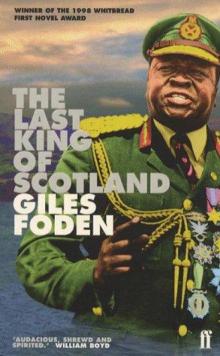 The Last King of Scotland (1998)
The Last King of Scotland (1998)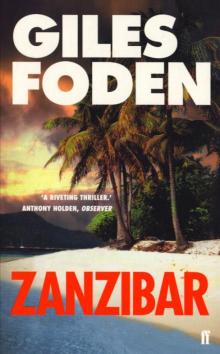 Zanzibar
Zanzibar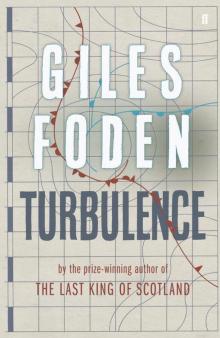 Turbulence
Turbulence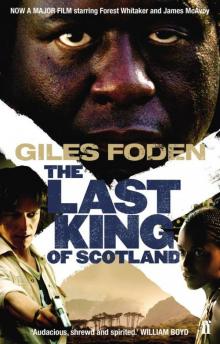 The Last King of Scotland
The Last King of Scotland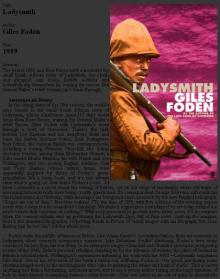 1999 - Ladysmith
1999 - Ladysmith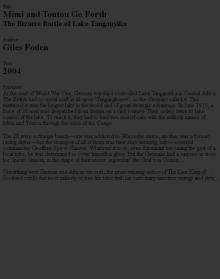 2004 - Mimi and Toutou Go Forth
2004 - Mimi and Toutou Go Forth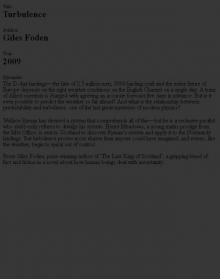 2009 - Turbulence
2009 - Turbulence